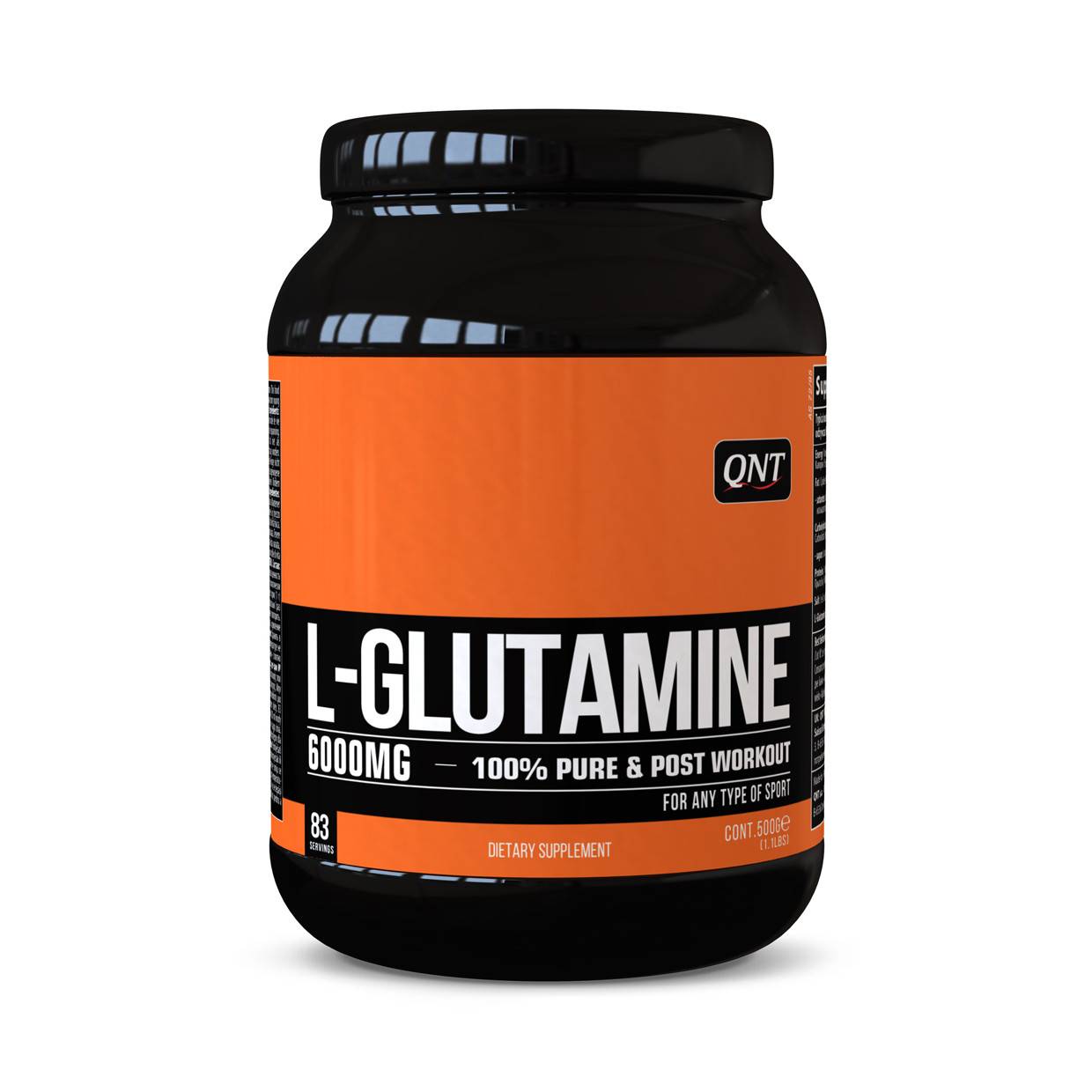
The scientific answer to this question is NO. As such, we will be taking time to dissect the overwhelming number of scientific pieces of evidence that conclude that L-Glutamine is not a adequate dietary supplement if the interest is muscle growth and muscle development.
What is L-Glutamine?
Glutamine is an amino acid, and like all amino acids, it has multiple functions in the body but primarily that of serving as a building block for proteins in the body. Twenty amino acids perform this vital “building block” function. Glutamine is the most plenteous amino acid in the body, and it is produced in the human muscles, after which the blood distributes it to the organs that need it. Like most amino acids, glutamine exists in two different forms, namely, L-glutamine and D-glutamine. Both forms of glutamine look so much alike they are nearly identical. However, there are minor differences in their molecular structure. The form of glutamine that is contained in food and supplements is L- glutamine. However, it is usually listed on most supplements with the broader term “glutamine.” One thing to note about glutamine is that it has been estimated that most diets contain 3 to 6 grams of it per day. Animal products contain the most significant amount of glutamine due to the high protein found in them.

Another essential fact about glutamine is that it is considered a conditionally essential amino acid. A conditionally essential amino acid is an amino acid that is produced by the body. However, its production halts in cases of unique disease conditions, such as prematurity or severe catabolic stress. This is opposed to essential amino acids, which cannot be produced by the body and must be supplied to the body through diet.

Read the full social media by Dr. Bill Campbell here: https://www.instagram.com/p/CS26kbiDbAx/
The effectiveness of glutamine supplements for muscle strength and protection, pointed out by Dr. Bill Campbell that even begin to record an effect of glutamine on muscle strength have all used about 20 grams of glutamine. However, considering the fact that the usual glutamine supplements available all use about 5 grams of the amino acid, it is safe to conclude that their effect will be non-existent. Not to mention that these “20-gram studies” are still very limited.
This position is further supported by the ISSN in the ISSN Position Stand and Journal. In a Journal titled “Dietary Supplements and Sports Performance: Amino Acids,” the ISSN stated that glutamine might be able to stimulate muscle glycogen synthesis, but that it has been recently concluded that adequate carbohydrate alone is sufficient for this. In addition, the journal mentioned recent research which state that neither short-term nor long-term glutamine supplementation leads to a significant increase in muscle mass or strength.
L-Glutamine supplements as an instrument for muscle growth and protection?
This is a prominent question that experts like us at the GPNi® get all the time. As stated in the article’s first sentence, the answer is no, L-glutamine does not work as an instrument for muscle growth and protection. Scientific powerhouses, including our partners, “The ISSN,” have all come to this conclusion after conducting and reviewing several studies. Some of the pieces of evidence to support this are discussed below.
What Is The Evidence?
As stated by Dr. Bill Campbel, the mere fact that glutamine is a conditionally essential amino acid means that the body provides what it needs, and “we do not need to supplement it or get it from foods.” One argument that is usually given for the position that glutamine works for muscle growth is that there are certain cases where due to particular diseases, the body would stop producing glutamine; in such cases, it is believed that the taking of glutamine supplements will ensure muscle growth and development. However, several scientific studies have revealed that this is not the case. In one study, participants took glutamine or placebo during six weeks of weight training. Upon completion of the study, both groups had improved in terms of muscle mass and strength. However, taking glutamine did not in any way make a difference for the group that did. Dr. Bill Campell went further to state that “much of the glutamine that is ingested never make it past the digestive system, thereby they are hardly used by the muscles. In addition, due to first-pass oxidation, most of the glutamine consumed orally do not pass the digestive tract (splanchnic bed)”.

Read the full social media by Dr. Bill Campbell here: https://www.instagram.com/p/CS26kbiDbAx/
The effectiveness of glutamine supplements for muscle strength and protection, pointed out by Dr. Bill Campbell that even begin to record an effect of glutamine on muscle strength have all used about 20 grams of glutamine. However, considering the fact that the usual glutamine supplements available all use about 5 grams of the amino acid, it is safe to conclude that their effect will be non-existent. Not to mention that these “20-gram studies” are still very limited.
This position is further supported by the ISSN in the ISSN Position Stand and Journal. In a Journal titled “Dietary Supplements and Sports Performance: Amino Acids,” the ISSN stated that glutamine might be able to stimulate muscle glycogen synthesis, but that it has been recently concluded that adequate carbohydrate alone is sufficient for this. In addition, the journal mentioned recent research which state that neither short-term nor long-term glutamine supplementation leads to a significant increase in muscle mass or strength.

Link to full article: https://jissn.biomedcentral.com/articles/10.1186/1550-2783-2-2-63#ref-CR23
A featured article on glutamine by “Healthline” also arrives at the same conclusion with these words: Studies have not shown that glutamine supplements can enhance muscle growth or strength.

Other Benefits of L-Glutamine Supplements
Even though L-glutamine as a supplement does not have any major effect on muscle strength and protection, some studies and trials have shown that it possesses other health benefits. Some of them include:
Immune System Support
Glutamine is the primary fuel source for lymphocytes (white blood cells that fight infections). However, blood glutamine levels decline when people are sick, reducing the immune cells’ ability to defend the body. As studies have shown, taking glutamine supplements can improve recovery time for ill individuals and reduce complications that come with sickness. Studies have also shown that glutamine supplements can significantly enhance immunity in animals with infectious diseases. It must, however, be noted that the evidence is not conclusive on whether glutamine supplements boost immunity in healthy people.

Intestinal Health Regulation
Glutamine’s immune-boosting properties are closely linked to its activity in the intestines. It contributes to maintaining the intestinal lining – which ensures that the body absorbs the nutrients it needs and helps protect people from serious health problems like leaky gut. Because the gut is the largest organ in the immune system, scientists believe glutamine may play a role in better immunity. Furthermore, scientific evidence shows that glutamine supplements can also help people with intestinal diseases such as Crohn’s disease, celiac disease, and peptic ulcer disease.

Health Risks of L-Glutamine Supplementation
Generally, glutamine is considered safe for the body when available in normal quantities. However, there are health risks and side effects to long-term consumption of glutamine and unhealthy amounts in the body. They include:
- Long-term supplementation may lead the body to transport amino acids differently, including glutamine. Furthermore, when glutamine consumption is increased, it could negatively impact amino acid distribution among tissues and absorption in the intestine and kidneys.
- A glutamine supplement could cause some mild side effects when newly added to a diet. Cough and changes in bowel movements are the most common adverse effects.
- In people suffering from liver and kidney diseases, glutamine supplements may worsen symptoms.
- Supplementing with glutamine may interfere with ammonia detoxification and negatively impact glutamine's role as an ammonia carrier within tissues.

Conclusion
Glutamine supplements may not be bad for you. However, it is essential to know what exactly to expect from them and what not to expect from them. Using L-Glutamine for muscle growth and protection may not work as expected, if at all, as scientific evidence points to that conclusion. However, for the health of the immune system and intestines, individuals may see some positive results.
References
https://jissn.biomedcentral.com/articles/10.1186/1550-2783-2-2-63#ref-CR23
https://pubmed.ncbi.nlm.nih.gov/22990615/
https://www.healthline.com/nutrition/glutamine#TOC_TITLE_HDR_3
https://www.webmd.com/diet/health-benefits-glutamine#2
https://www.instagram.com/p/CS26kbiDbAx/







